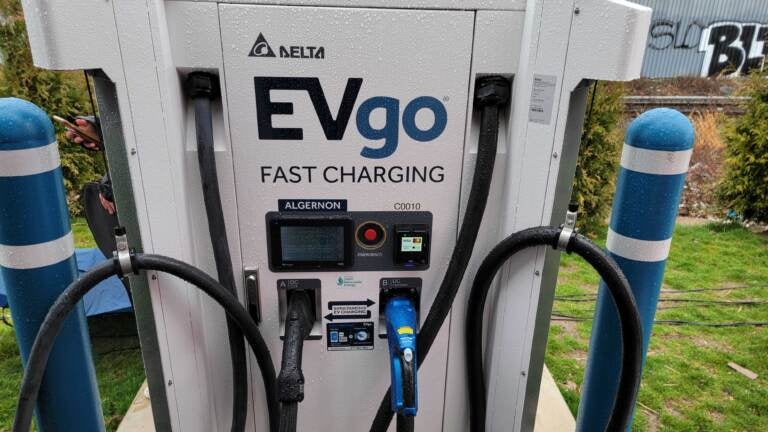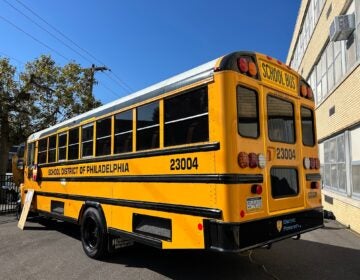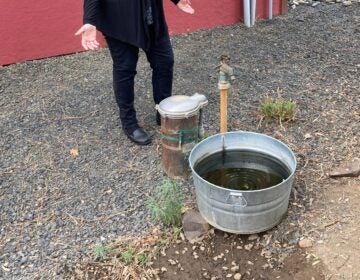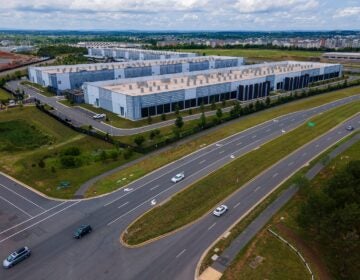Delaware secures $14.3M to expand overnight, fast and ultra-fast charging stations along I-95 corridor
The federal money will support the state’s move toward more electric vehicles by adding overnight, fast and ultra-fast truck chargers on I-95.

One of the new bank of EVgo quick chargers for electric vehicles outside a Wawa store at Aramingo Avenue and Wheatsheaf Lane in Philadelphia. (Tom MacDonald/WHYY)
This story is part of the WHYY News Climate Desk, bringing you news and solutions for our changing region.
From the Poconos to the Jersey Shore to the mouth of the Delaware Bay, what do you want to know about climate change? What would you like us to cover? Get in touch.
Delaware will upgrade its electric vehicle charging infrastructure along Interstate 95, specifically for electric trucks, after getting $14.3 million in federal funding. State leaders who gathered Thursday morning at the Biden Welcome Center rest stop near Newark called it a critical step toward transforming the state’s transportation system and reducing its environmental impact.
As a major pass-through state for traffic along I-95, Delaware has faced growing transportation challenges, including congested roads and rising pollution levels that have worsened air quality in the state. Transportation is the leading source of Delaware’s carbon footprint, contributing about 30% of the state’s greenhouse gas emissions. The growing environmental impact has made the push for cleaner, more sustainable transit solutions more urgent than ever. Last year, the state moved ahead with a mandate for car dealerships to sell more and more zero-emission vehicles, starting in three years.
The funding announced Thursday comes through the U.S. Environmental Protection Agency’s Climate Pollution Reduction Program, which is part of the Inflation Reduction Act, the country’s largest effort to tackle climate change. It is part of a larger grant secured by Maryland, Delaware, New Jersey and Connecticut, all states with major freight traffic along the I-95 corridor.
“It’s a $249 million grant for all of us. Delaware’s receiving about $13.6 million of that,” said Nicole Majeski, secretary of Delaware’s Department of Transportation. “We are hopeful that now the trucking industry will see that this infrastructure is there for them and now they can invest, and there’s EV trucks as opposed to the diesel powered ones.”
In May, the Biden administration approved new tailpipe emission standards for heavy-duty trucks as a way to cut carbon emissions and curb harmful air pollutants. The rules are the most stringent to date, and while manufacturers decide how to meet those targets, they are likely to shift to battery operated vehicles.
Like its neighbors, Delaware faces significant transport and transportation challenges with a big increase in freight moving across state roads.
“Just over the last few years, especially during the pandemic, our reliance on e-commerce has just exploded and that results in the need for more trucking, for more freight movement, and we see that,” Majeski said. “It’s really important for us … [to] provide the infrastructure they need so they can embrace this clean energy that’s out there.”
Adam Ortiz, the administrator for EPA’s mid-Atlantic states, agrees that trucking should be a priority too.
“We’re all familiar with electric cars, we’re seeing them more and more and that’s been making a difference in reducing greenhouse gasses. But heavy trucks are something where we have historically not made a lot of progress,” Ortiz noted. “[Today], we’re putting a stake in the ground, a number of states across the I-95 corridor stepping up to help heavy electric vehicle charge.”
Across Delaware, Maryland, New Jersey and Connecticut, the goal is to establish over 400 charging ports for trucks, ranging from overnight charging stations to fast and even ultra-fast charging options.
“The Clean Corridor Coalition project plans to support the construction of 20 freight truck electric charging sites, including 150 charging ports, overnight use, and more than 300 fast or ultra-fast charging ports to advance electrification of a national priority freight corridor,” he said.
Next year, state transportation leaders will collaborate with the Delaware Department of Natural Resources and Environmental Control to gather public feedback and identify gaps in clean energy initiatives while continuing to prioritize sections of I-95 that run through the state. The focus will also extend to I-495 and other areas throughout the state.

Get daily updates from WHYY News!
WHYY is your source for fact-based, in-depth journalism and information. As a nonprofit organization, we rely on financial support from readers like you. Please give today.







